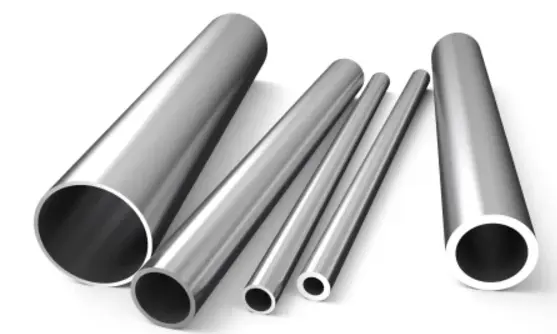
What is Titanium Pipes?
Titanium stands out as a shiny transition metal because it possesses two vital characteristics which combine superior corrosion resistance with outstanding strength density ratios that match steel's strength at half its weight. Titanium maintains excellent ductility and low density when placed in an environment without oxygen. Different titanium alloy grades form the basis of Titanium Pipe and Tubes production. Commercial titanium grades exist alongside titanium alloy grades. Titanium pipes follow specifications that include ASTM B337 and ASTM B338. The titanium pipe and tube market includes seamless, welded and ERW and fabricated pipe and tube types.
What is Titanium Tube?
Titanium Tube exists as an alloy which demonstrates exceptional strength compared to its weight. The titanium alloy tubing demonstrates excellent ductility as one of its properties. The titanium tubing shows a paramagnetic response in its content. The electrical and thermal conductivity of titanium tubes stands significantly lower than other metal materials. The Titanium Tube demonstrates superior smoothness by featuring minimal absolute roughness. Grade 5 titanium stands as the most commonly employed grade among all titanium grades. The Grade 2 Titanium Tubing belongs to the category of commercially pure grades.
Titanium Product Types:
Seamless Titanium Pipes:
Seamless titanium pipes are the strongest type of titanium pipe. They are made without any welded seams, which produces a highly robust and uniform structure. These pipes are renowned for their exceptional strength-to-weight ratio, boasting tensile strengths ranging from approximately 30,000 psi to 200,000 psi, comparable to many alloy steel grades. Titanium Seamless Pipe is distinguished by a high strength-to-weight ratio. In an oxygen-free area, it is very ductile and has a low density. These properties make seamless titanium pipes highly sought after in industries like aerospace, chemical processing, and oil and gas, where high performance and reliability are paramount.
Welded Titanium Tubes:
Welded titanium tubes, including those produced through Electric Fusion Welding (EFW), present a viable, cost-effective alternative to their monolithic cousins, with no appreciable loss in titanium's high-strength, low-weight, and corrosion-resistant characteristics. These tubes are formed by welding titanium sheets or strips, maintaining the material's lightweight nature (56% the density of steel) and high corrosion resistance, often comparable to platinum as per ASME SB337. They also develop the protective oxide surface film when exposed to air, enhancing their resistance to corrosive environments. Welded titanium tubes adhere to standards like ASTM B337 and ASTM B338. When you consider the weldability and formability of titanium, along with its lightweight and corrosion-resistant nature, the tubes coming off this lineup could find application in a wide variety of industrial settings, especially in oil refineries and petrochemical plants, where they could serve as heat exchangers, condensers, and tubing for other uses.
Specifications of Titanium Pipes and Tubes
Titanium Pipe
| Standard | ASTM B 337 ASME SB 337 / ASTM B 338 ASME SB 338 |
|---|---|
| Dimension | ASTM, ASME, and API |
| Size | ½”NB to 24”NB in Sch 10s, 40s, 80s, 160s, XXS. |
| Tube Size | 6 mm OD x 0.7 mm to 50.8 mm OD x 3 mm thk. |
| Outer Diameter | 1.5 mm – 350 mm |
| Thickness | 0.3 – 9 mm |
| Form | Round, Square, Rectangular, Hydraulic Etc |
| Length | Double Random, Single Random, Cut Length |
| Types | Seamless / ERW / Welded / Fabricated |
| Schedule | SCH20, SCH30, SCH40, STD, SCH80, XS, SCH60, SCH80, SCH120, SCH140, SCH160, XXS |
| End | Plain End, Beveled End, Threaded |
Titanium Seamless Tube
| Dimension | Outer Diameter | Thickness | Length |
|---|---|---|---|
| Size Range: | 0.5mm – 330mm | 0.4mm – 10mm | Max 15m |
| Manufacturing Standards | ASTM B338, ASTM B861, DIN 17 861 |
Titanium Welded Tube
| Dimension | Outer Diameter | Thickness | Length |
|---|---|---|---|
| Size Range: | 114mm – 2000mm | 0.5mm – 50mm | Max 15m |
| Manufacturing Standards | ASTM B338, ASTM B862 |
Chemical Composition of Titanium Pipes and Tubes
| Grade | C | N | O | H | Ti | Fe |
|---|---|---|---|---|---|---|
| Titanium Grade 1 | .08 Max | .03 Max | .18 Max | .015 Max | Bal | .20 Max |
| Titanium Grade 4 | .08 Max | .05 Max | .40 Max | .015 Max | Bal | .50 Max |
| Titanium Grade 7 | .08 Max | .03 Max | .25 Max | .015 Max | Bal | .30 Max |
| Titanium Grade 9 | .08 Max | .03 Max | .15 Max | .015 Max | - | .25 Max |
| Titanium Grade 12 | .08 Max | .03 Max | .25 Max | 0.15 Max | - | .30 Max |
Mechanical Properties of Titanium Pipes and Tubes
| Density | Melting Point | Yield Strength (0.2%Offset) | Tensile Strength | Elongation |
|---|---|---|---|---|
| 4.5 G/Cm3 | 1665 °C (3030 °F) | Psi – 39900 , MPa – 275 | Psi – 49900 , MPa – 344 | 20 % |
| 4.43 G/Cm3 | 1632 °C (2970 °F) | Psi – 128000 , MPa – 880 | Psi – 138000 , MPa – 950 | 14 % |
Material Equivalent Grade of Titanium Tube
| STANDARD | UNS | WERKSTOFF NR. |
|---|---|---|
| Titanium Gr 2 | R50400 | 3.7035 |
| Titanium Gr 5 | R56400 | 3.7165 |
Tolerances of Ti Welded Tube
| O.D. INCHES | WALL THICKNESS INCHES | O.D. +/- INCHES |
|---|---|---|
| 1/2" to 1" incl. | .025 to .065 | .005 |
| Over .065 to .134 | .010 | |
| 1 to 1-1/2" incl. | .025 to .065 | .008 |
| Over .065 to .134 | .010 | |
| 1-1/2" to 2" incl. | .025 to .049 | .010 |
| Over .049 to .083 | .011 | |
| Over .083 to .148 | .012 | |
| 2" to 2-1/2" incl. | .032 to .065 | .012 |
| Over .065 to .109 | .013 | |
| Over .109 to .165 | .014 | |
| 2-1/2" to 3-1/2" incl. | .032 to .165 | .014 |
| Over .165 to .220 | .020 | |
| 3-1/2" to 5" incl. | .083 to .165 | .020 |
| Over .165 to .220 | .025 |
Pressure Rating of Titanium Alloy Tubing
|
Tube O.D. (in.) |
Wall Thickness of Tube (inches) |
|||||||
|---|---|---|---|---|---|---|---|---|
|
.028 |
.035 |
.049 |
.065 |
.083 |
.095 |
.109 |
.120 |
|
|
Working Pressure (psig) |
||||||||
|
1/8 |
7900 |
10100 |
|
|
|
|
|
|
|
1/4 |
3700 |
4800 |
7000 |
9500 |
|
|
|
|
|
5/16 |
|
3700 |
5400 |
7300 |
|
|
|
|
|
3/8 |
|
3100 |
4400 |
6100 |
|
|
|
|
|
1/2 |
|
2300 |
3200 |
4400 |
|
|
|
|
|
3/4 |
|
|
2200 |
3000 |
4000 |
4600 |
|
|
|
1 |
|
|
|
2200 |
2900 |
3400 |
3900 |
4300 |
Application of Titanium Pipes and Alloy Tubing
- Aerospace
- Power Generation
- Oil and gas
- Chemical Processing
- Heat Exchangers: Seamless Titanium Grade 2 tubes are mainly used for heat exchangers.
- Condensers and Instrumentation Applications
- HPAL Plants: Welded or seamless pipes in Titanium Grade 2 or Grade 12 are used for High-Pressure Acid Leach (HPAL) plants.
- Exhaust Systems: Welded Titanium Grade 1 or Grade 2 tubes are used in exhaust systems for performance street cars or racing cars.
Titanium Pipe Types
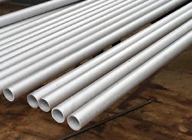
Ti Polished Pipe
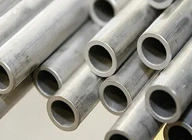
Thick Wall Titanium Alloy Pipe
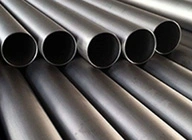
Schedule 5S Titanium Pipe
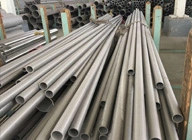
Schedule 40 Titanium Pipe
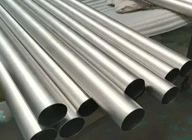
Cold Drawn ASTM B337 Titanium Seamless Pipe
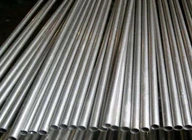
Titanium Alloy Electropolished Pipe
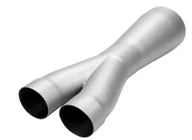
ASTM B337 Ti Alloy Exhaust Pipe
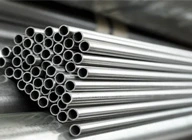
Thin Wall ASME SB861 Titanium Pipe
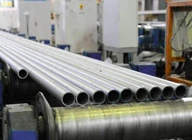
ASTM B337 Titanium Seamless Pipe
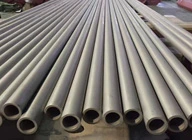
ASTM B861 Titanium Welded Pipe
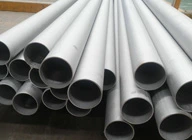
Ti ERW Pipe
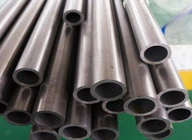
Ti Alloy Hollow Pipe
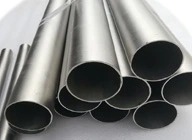
ASME SB337 Titanium Round Pipe
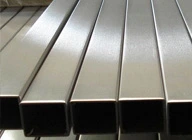
Ti Alloy Square Pipe
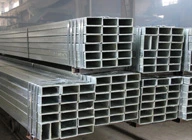
ASME SB861 Titanium Rectangular Pipe
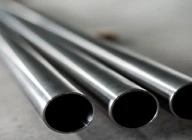
ASTM B861 Titanium Custom Pipe
Why Choose Us for Titanium Pipes & Tubes?
The manufacturing and exporting activities of high-grade Titanium Pipes & Tubes at Amardeep Steel Centre take place under one entity. Our product range includes different grades and dimensions of these products which we supply to domestic and international customers.
Get in touch with us today for complimentary quotes, specifics about our products, and cost details. Rely on Amardeep Steel Centre for everything related to your requirements for pipes and tubes made from titanium!
FAQs
1. How thick is a titanium tube?
Titanium tubing is available in an outer diameter range of 9.53–38.1 mm (3/8–1½ in.) with wall thicknesses from 0.7 to 5 mm (0.0275 to 0.1968 in.).
2. What grades of Titanium Tubes are available?
Titanium tubes are available in both commercial purity and alloyed grades; the most common of these being: Grade 2 Commercially Pure Titanium and Grade 5 Titanium Alloy.
3. Are Titanium Tubes stronger than steel?
Titanium tubes are comparably strong. Titanium tubes have a similar strength to steel but weigh approximately 50% less, making them an excellent choice for weight-sensitive applications.
